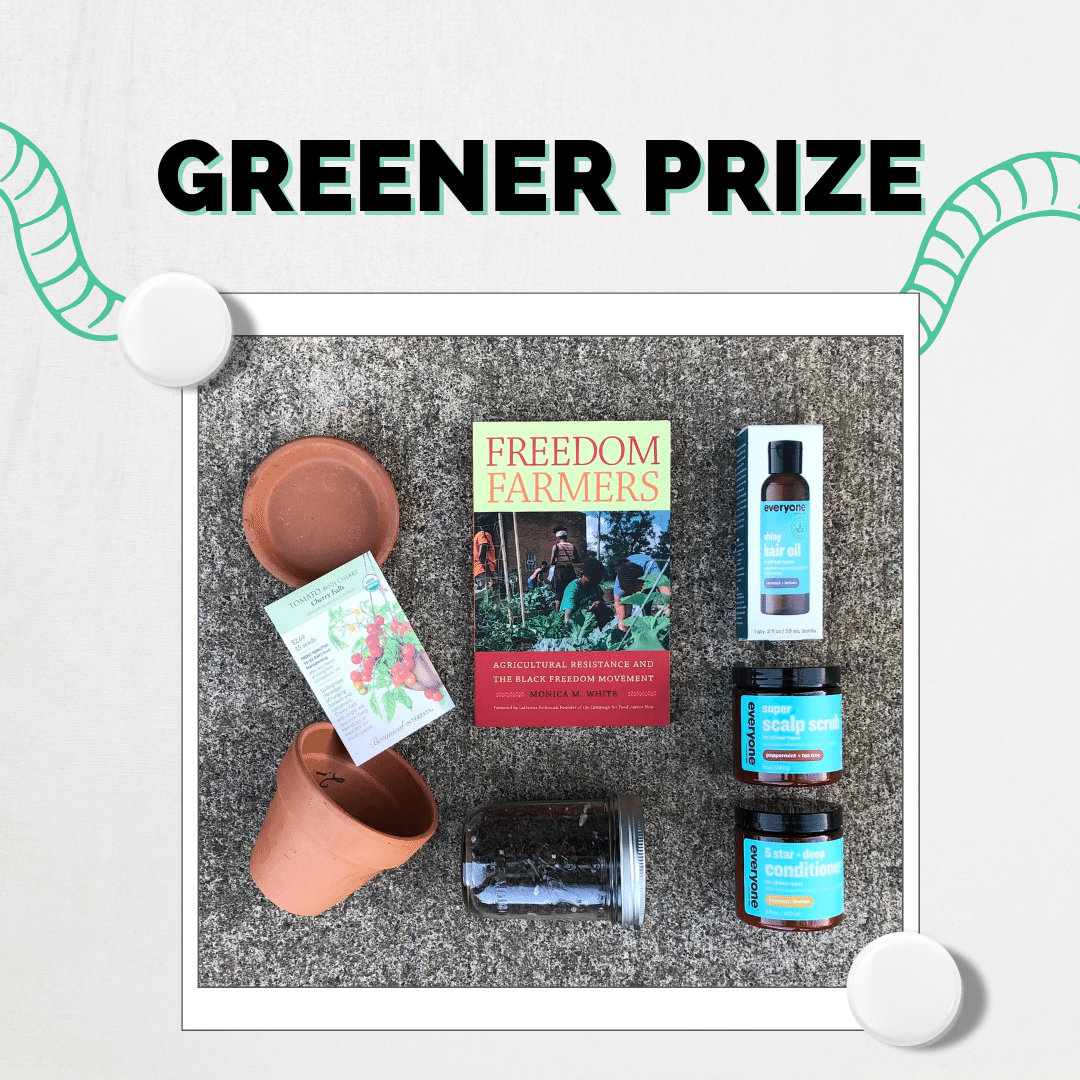
How does soil mitigate climate change?
Soil is vital to life. Healthy soils are critical to food security, water protection, human health, and the creation of resilient ecosystems that help combat climate change. When soil is healthy, it acts as a home for countless forms of life that sequester carbon from the atmosphere. From there, the carbon is either stored safely in the Earth or transformed into valuable nutrients.
However, soil is not an infinite resource. It can take anywhere from 500 to 1,000 years for an inch of topsoil to form, depending on the ecosystem. Rising temperatures, mismanagement of natural areas, and industrial monocropping have led to dried-out, loose, and unhealthy topsoil across the globe. The Midwestern United States alone has lost 57.6 trillion metric tons of soil as a result of modern agricultural practices.
When the health of our soil is at risk, so too is the health of our communities. Loose topsoil can be picked up by the wind and harm both ecosystems and local communities. For example, Coccidioides, the fungus that causes Valley Fever, thrives in loose topsoil in the American Southwest and disproportionately impacts Latine and Indigenous farmers who work in the area. Sustained megadrought conditions have only worsened the threat, resulting in a rapid increase in cases from 2014 to 2022.

Soil loss is not only a threat to the health of local communities, but also to their roles in global agriculture and food supplies. From the American Southwest to Sub-Saharan Africa, many farmers consider soil loss to be a pressing concern for agriculture, especially in conjunction with other devastating ecological trends like droughts. When soil is lost through erosion, farmlands lose valuable nutrients stored within the soil, making it difficult to successfully harvest crops. Without sufficient methods to combat erosion, the United States loses an estimated $44 Billion worth of agricultural products annually as a result of topsoil loss. It’s difficult to even imagine how many people could be fed with $44 Billion worth of produce.
“Outside the farming sector, people do not understand how important soils are to the climate. Changing farming could make soils carbon negative, making them absorb carbon, and reducing the cost of farming.”
– Jacqueline McGlade, former chief scientist at the UN environment programme, former executive director of the European Environment Agency.
For decades, farmers and governments have sought to counter soil loss by supplying low-cost artificial fertilizers to fields. However, this can fail to combat soil loss and create a myriad of other issues such as over fertilization and biodiversity loss. When these fertilizers erode with the soil into bodies of water, they can create destructive nutrient-rich dead zones that suffocate marine life by consuming all of the available oxygen in a given space. All of these issues point towards the fact that the power to change the way we interact with our soils and, in doing so, create a healthy and green future for generations to come is in our hands – or rather, beneath our feet!
Rather than add fertilizers to fields, plants can be used to regenerate and build back the soil. Dr. Roland Bunch, author of Restoring the Soil, is a leader in the field of regenerative land management and a major proponent of this approach, which he calls green manure. Green manure refers to the planting of certain species that enhance soil health by storing water, adding nutrients, preventing weed growth, and decomposing to enrich soil. This vegetation can be as simple and commonplace as bushes, vines, and trees, and it has the potential to eliminate the need for artificial fertilizers. Farmers should also rotate their crops and plant perennial plants, which increases and stabilizes soil fertility.
Such practices have positive impacts beyond the field. Regenerative agricultural techniques are an effective way to heal our planet by returning carbon to the ground. Keeping carbon locked in is a crucial step towards combating climate change and creating a more sustainable future. Our partner Kiss the Ground works tirelessly to raise awareness, inspire participation in the regenerative agriculture movement, and promote soil health. It is not enough to preserve what is left; we must also restore what has been lost.
There are many organizations and businesses using innovative solutions to keep our soils healthy. Our partner Everyone cares for soil as a certified organic manufacturer that values transparency, choosing to meet food-level guidelines of the California Certified Organic Farmers (CCOF), as there are no certifications for personal care products.
You don’t have to be a farmer or researcher to help save soil. We can all play a role as global citizens promoting the health of our soil and communities by supporting local, organic, and regenerative farms. When buying produce, look for third-party certifications, such as the Regenerative Organic Certification (ROC). Composting is another great way to promote soil health in your own home or garden. You can encourage your school and surrounding community to do the same, redirecting valuable nutrients from landfills into food for healthy soils. Use compost for your own plants, drop it at a nearby community garden, or find a local pickup service that puts it to good use. Help heal our planet by saving our soil!
When we talk about climate change, soil is often left out of the conversation — yet it is one of the most important layers of the solution! As environmentalists, it is critical to understand the relationship between agriculture, soil, carbon, and climate change. Furthermore, it is imperative to learn about and honor the deep traditions and roots of sustainable and regenerative farming practices that BIPOC communities have practiced for centuries. Soul Fire Farm, Rock Steady Farm, and Green Heffa Farms are a few inspirational examples.
Your first task is to get informed. Read this article about Black farmers practicing regenerative agriculture. Then, watch one video on Soul Fire Farm’s YouTube channel and write a short reflection.
In 200 words or less, respond to the following:
Then, share one fact about regenerative agriculture on Instagram as a powerful text-driven post. Tag @TurningGreenOrg, @KissTheGround, any additional resources used or organizations referenced, and remember to include #PGC2023 in the caption of your post!
Upload your results and responses in a PDF document including a screenshot of your social post. Include your name (or team name), username, and school on your upload.
Submission Guidelines
Now that you’ve been introduced to the wonders of soil, we encourage you to dig deeper. Knowledge is power!
It’s time to complete your very own Soil Quest. Our partners, Kiss the Ground and Captain Planet Foundation, have created a training module to help you be an advocate for healthy soil. You can go at your own pace with this brief training and by the end, you’ll be ready to advocate for soil in your community!
After completing the Questions, Uncover, and Explore sections of Soil Quest, reflect on which aspects you can apply locally. Write down three interesting findings from your quest.
Post a photo that encapsulates healthy soil on Instagram (credited appropriately!) with a short caption that includes at least one of your learnings, tagging @TurningGreenOrg, @KissTheGround, @CaptainPlanetFdn, any resources used or organizations referenced, and #PGC2023.
Upload your responses in a PDF document including a screenshot of your social post. Include your name (or team name), username, and school on your upload to be eligible to win.
Submission Guidelines
Gardens promote climate resiliency and personal resilience. Not only does planting a garden help the environment, but it also offers the opportunity to provide food for yourself and others. Regenerative gardening is also be a great way to replenish soil around you — for healthy plants, air, and animals too.
It’s time to get your green thumb on!
Start thinking about where you could plant a garden, whether indoors or out. What would work best for your space and lifestyle? Are there seeds that you could grow indoors for a few months and then replant outside in the spring? Could your kitchen use an herb garden?
Now, create a plan for your garden. Consider what you would plant and why those select items. If you need extra guidance, check this beginner’s guide on gardening. Check out this video from Kiss the Ground for five easy ways to make your garden regenerative. Read the regenerative living guide to make informed decisions that support soil health and a regenerative lifestyle. As you plan, make sure that all of your seeds and saplings are native or non-invasive. Happy planting!
In a document, describe the following in about 500 words:
Upload your responses in a PDF document including a screenshot of your social post. Include your name (or team name), username, and school on your upload to be eligible to win.
Submission Guidelines
Our partner released a full-length documentary by the same name, Kiss the Ground, that unearths the devastating impacts of industrial agriculture on our planet — and the potential of regenerative agriculture to balance our climate, replenish vast water supplies, and feed the world.
Gather at least 3 friends or family members for a screening of the documentary, either in person or remotely. It is available on Netflix and other streaming services or you can access it using this link: https://vimeo.com/464327339 Password: viva
Raise, discuss, and record answers to the following questions:
Share a screenshot or image from the film on Instagram with a caption that includes one of your favorite facts to raise awareness about healthy soils! Tag @TurningGreenOrg, @KissTheGround and @KissTheGroundMovie, as well as #PGC2023.
Upload your responses in a PDF document including a screenshot of your social post. Include your name (or team name), username, and school on your upload to be eligible to win.
Submission Guidelines
Up to 10 Greener and 10 Greenest outstanding submissions will be selected as winners.

Each Greener Winner will receive:

Each Greenest Winner will receive: